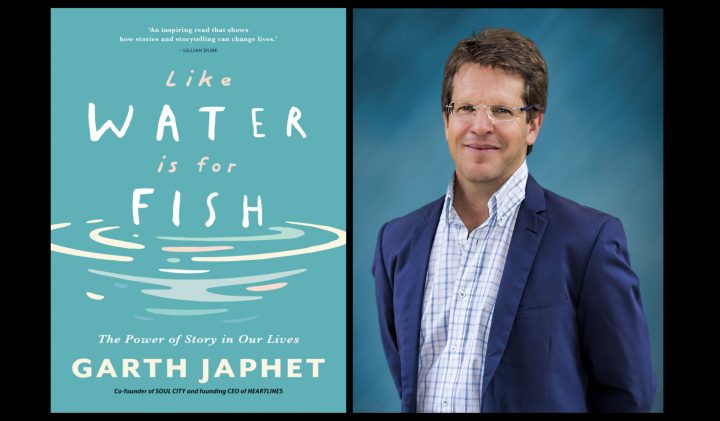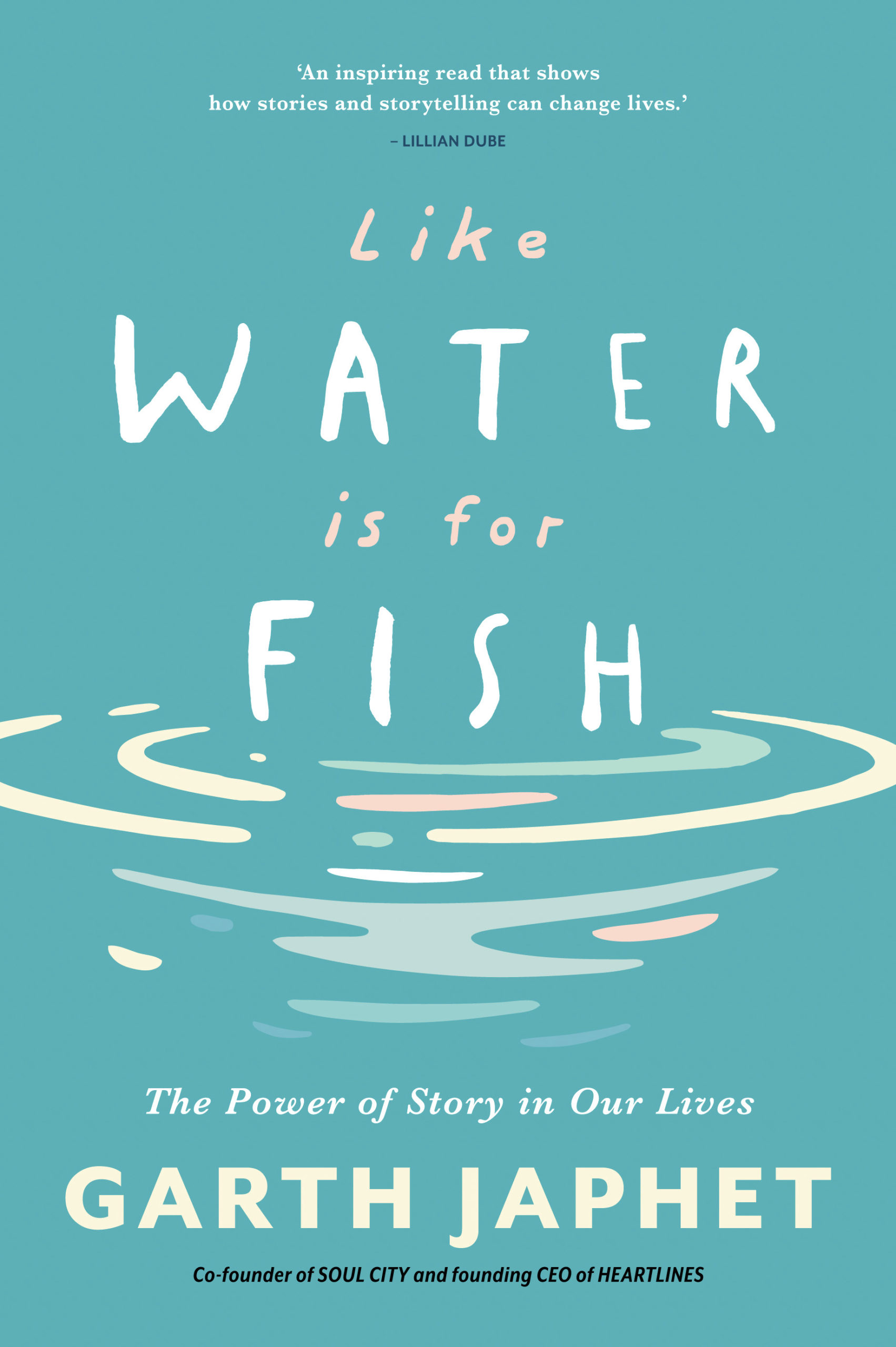Maverick Citizen Op-ed
World of despair: Living with ‘stuffed head syndrome’

Over the years I have been fortunate enough to be invited to give a number of talks, including for corporate and academic audiences, on school founders’ day and at university graduation ceremonies. Quite often I illustrate points with anecdotes from my life. After all, there is nothing better to hook an audience than a story.
A significant part of my journey has been characterised by a battle with mental health, both anxiety and depression.
At some point I realised that if I did not talk about it then I am guilty of perpetuating the stigma and shame that surrounds mental illness, particularly among men. So, whenever the context fits, I tell my story about mental illness and hope that in doing so I do a little bit to normalise it and to give others the licence to speak about it, too.
This extract from my book Like Water is for Fish describes one such talk and the licence it gave to a seemingly “together” man to talk:
There are a few more questions, which I do my best to answer and then the MC turns to thank me again. Before he can, a middle-aged man tentatively puts up his hand. There is a momentary pause while he waits for the microphone to be passed along to him. He stands. He is tall. Aquiline nose, dark hair receding but still full.
“Thank you for sharing your story,” he begins. “I’ve never heard anyone talk about ‘stuffed head syndrome’ before.’ He hesitates before continuing. “I presume you meant some form of mental illness because you then proceeded to say that you were ‘heavily medicated for the protection of the masses’. Would I be right?”
I didn’t see this coming, but actually I’m glad for the question.
“Yes,” I say, “you are right. I’ve suffered from anxiety and depression for most of my life and it’s led me into some very dark places. I feel strongly that if a so-called successful person like me doesn’t talk about it, I just perpetuate the stigma.” I can feel my cheeks glowing and I begin to speak faster. This often happens when I feel passionate about something. It can be quite off-putting as I can come across as a deranged zealot, but I can do no other. “For years we’ve believed the narrative that mentally ill people are crazy or even demon-possessed, so we’ve locked them up or killed them off. Now, while we don’t kill people, we often see them as weak attention seekers who should ‘just pull themselves together’.”
People are looking at me strangely. Where has the calm health professional gone?
“I’m sorry,” I say, “but that rubbish makes me absolutely mad. Mental illness is as treatable as asthma or diabetes, but because it’s the brain we don’t see it that way.”
The man puts his hand up again but I can see the MC wants to bring the session to a close, so I say, “Perhaps we could meet afterwards?” The man looks relieved. I suspect I’ve touched a nerve.
It’s been a long day, and the nervous energy I’ve expended on the talk has left me drained. I’d rather go straight home, but I have a deep sense that talking to this man is important.
Up close, Jeff, for that is his name, looks like a successful professional. Probably mid-40s, athletic. His blue button-down shirt is tucked into khaki chinos. We find a quiet corner of the conference venue and after ordering some coffee and a slab of chocolate cake (I need the sugar!), we sit down.
“Thank you for your time,” Jeff says. “I hope you don’t mind.”
“Not at all.”
“Telling your story like that was brave.”
“I don’t think so. If telling it might help someone, I feel it’s both my pleasure and responsibility to do so,” I say.
“How have you managed?” he asks. “I mean, how do you keep it together? I’ve been struggling for a while with what you call ‘stuffed head syndrome’ and I don’t know that I can carry on.” The pain is evident in his voice.
Despite my desire to normalise this illness, I find myself shocked by my inability to reconcile this seemingly successful man with my perception of what a suicidal person looks like.
“I’m sorry,” I say. I’m not a great listener, I’m too easily distracted, but I know that to be truly present is important, so I try. “Perhaps you can tell me a little of your story?” I suggest. “Not your CV. Your story.”
Jeff looks at me warily, like I’ve asked him to commit a crime. Many people haven’t ever thought about their story, let alone shared it, and the prospect can be scary. Cautiously he says, “Okay, I’ll try”.
After a halting start he becomes less conscious of my listening and moves back in time, one memory sparking the next. His is what many would term an unremarkable story (although I don’t believe there is such a thing) and he is almost apologetic in the telling of it because he does not have a traumatic event to lend credence to his current despair. He has lived the fairy tale. A middle-class upbringing, a loving family. Popular and successful at school and then university. Qualified as a chartered accountant.
Great job, happily married with two children he adores and now, aged 45, he wants to end it all. Why? What possible reason does he have for his despair? For his suicidal thoughts? It’s almost as if his pain is worse because he can’t find any reason for it. He cannot understand it, but I can: For an analytical person, 90% of the answer is to understand the problem and this is the one thing he can’t do.
 I find myself caught up in Jeff ’s story. This invariably happens to me when I listen to other people’s stories. To be transported for a short while into a person’s world is a privilege.
I find myself caught up in Jeff ’s story. This invariably happens to me when I listen to other people’s stories. To be transported for a short while into a person’s world is a privilege.
“When did you start feeling like this?” I ask.
“Probably in the last year,” he tells me. “It started with me waking up early, like 4am, and then not being able to get back to sleep. I’d lie awake and worry about crazy irrational stuff. What if I get cancer? Then I might lose my job. Then maybe my wife might leave me and take the kids with her and then I would be all alone. And then?” He gives me a wretched look. “It’s the most awful feeling,” he says. “My heart races, I toss and turn and I can’t stop thinking. One worry sparks the next and because there is no answer to any of them, they feed on each other, growing bigger and more out of control, the more I think.”
His story comes pouring out of him. I am sure this is the first time that he’s been able to be honest about where he is at and I can sense his relief.
He continues. “Then morning comes and with it exhaustion, but also some perspective. I am amazed at how illogical my worries seem by the light of day. Then night comes and the cycle repeats itself.” He stops for a minute. “I became afraid of going to sleep. I began to drink heavily, hoping that it would help, but it only made matters worse.”
He looks at me warily, perhaps to gauge whether I am judging him.
“And now?” I ask in what I hope is my most comforting voice.
“Well, now I’m not just waking early, but I battle to get out of bed in the morning. Not even the daylight helps. I walk around in a fog of deep weariness. It feels like I’m just playing the role that’s expected of me. Inside I’m desperate. It’s the most terrible feeling imaginable. I can’t see a way out.”
I’m finding this hard. Jeff is describing my own symptoms and although, thank God, I have mine under control, his description evokes in me a visceral reaction. Tight chest, pounding heart. I take a few breaths. This is not about me.
“And the worst is that you look absolutely fine,” I say gently.
“Yes,” he says despairingly. “If someone has a broken leg or some physical illness, people can get their heads around that and empathise. But when I tell people, even my wife, how I’m feeling, they just can’t get it. I know what they’re thinking: What on Earth do I have to be worried about? And they’re right. Compared to many, I’m blessed beyond measure. Knowing that I have no reasons for how I’m feeling just makes me feel even more hopeless. Maybe I’m going crazy.” He gives a deep sigh. “I look into my future and if it weren’t for my wife and kids, I think I would end it.”
Jeff looks at me miserably. In situations like these, I’m grateful for my journey.
“Thanks for sharing that with me,” I say. “If it’s any consolation, I understand.” DM/MC
This is an extract from Like Water is for Fish, The Power of Story in Our Lives by Garth Japhet, published by Pan Macmillan in 2021. The book is available in all good stores and here are the links to buy it online: Heartlines: https://www.heartlines.org.za/shop/products/p2
Exclusive Books: https://www.exclusivebooks.co.za/product/9781770106444
Watch Mark Heywood’s conversation with Japhet here.



















 Become an Insider
Become an Insider
Thank you!
That’s my boet. Anxiety disorder runs in our family but with treatment we are on top of it.
Just like say a thyroid disorder – treat it and life goes on – no big deal.
Thank you. It’s a story that’s brave in the telling of it.
I did a consulting Psychology doctorate on Midlife crisis and it seems that Jeff is experiencing the classical symptoms of a Midlife crisis. Therapy or coaching by someone with experience in life transitions will definitely help.